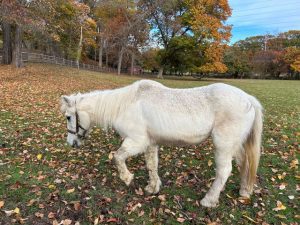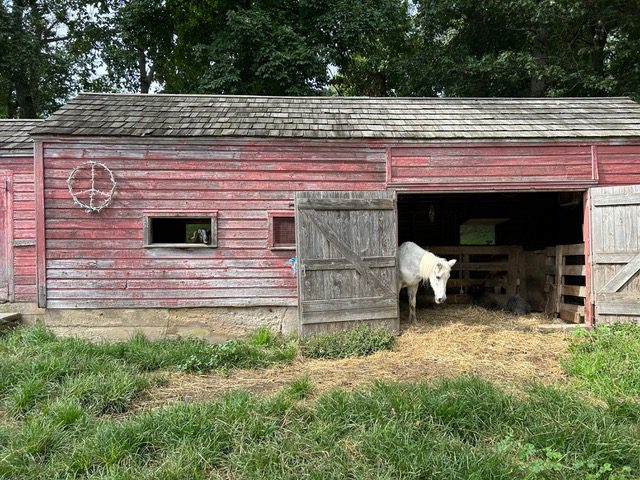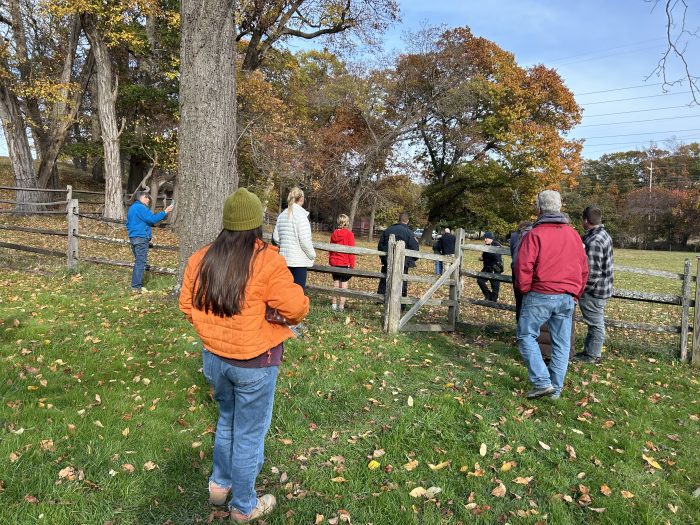Preservation Long Island is exploring other ways to run a working farm
By Mallie Jane Kim
The bucolic farm scene on East Setauket’s historic Sherwood-Jayne Farm no longer includes grazing animals, as the elderly pony and four sheep who lived there were recently moved to new homes. According to farm owner Preservation Long Island, they are settling in well, and the organization is looking forward to the future of the farm.
“It’s a new beginning, and it’s a nice place,” said PLI executive director Alexandra Wolfe.

According to Wolfe, the sheep have gone to Berkshire Farm Sanctuary in Massachusetts, and the pony, Snowball, has moved to a private family property on Long Island, with people who are familiar with caring for elderly ponies. Wolfe said PLI moved Snowball first so she wouldn’t be left alone on the farm, after a vet deemed her safe for transport and “very sound” for a pony her age — some 40 years old.
Wolfe said her contact at the farm sanctuary told her this week that the sheep are adapting well and getting ready to join a new flock. “It looks like heaven up there, as far as I’m concerned,” Wolfe said of Berkshire. “If I was an animal, I’d want to go retire there.”
It was a calm end to a contentious chapter on the farm. After hearing of plans to rehome the animals last summer, some area residents protested in an attempt to get PLI to change its plans — people were attached to the animals and enjoyed having that picture of historic farm life on Old Post Road. A petition to that effect garnered more than 3,500 signatures.
Surprised by the community response, PLI paused plans for a time but ultimately arrived on a November morning to move the animals, with short notice to the animals’ longtime caretaker Susanna Gatz. Friends of Gatz and other concerned neighbors formed an impromptu protest. Tensions ran high, but in the end the organization tasked with transportation decided the animals were too spooked to force into a vehicle.
Despite the protests, PLI maintained that animal care was not central to their mission, which is to celebrate and preserve the cultural and architectural heritage of the region. Also, Wolfe explained, the organization’s board didn’t feel it could meet best practices related to maintaining livestock at historic sites, pointing to a document that lays out details to consider, including fencing type, feed storage, security measures and many other factors.
“Preservation Long Island doesn’t have the capacity or resources to implement a viable interpretation of 19th-century livestock farming.” Wolfe explained. “The primary motivator for Preservation Long Island is best practices.”
So PLI opted to give Gatz official notice to move out of her on-site apartment, and they waited until she had moved and the freezing weather passed before rehoming the animals.
Still, some residents are sad to see the farm quiet, without its grazers. The school bus that drives by every afternoon will no longer slow down for the kids to wave at Snowball and the small flock of sheep.
“It’s a bit lifeless now,” said Tony Lopez of East Setauket. “It was always nice when you drove by and saw someone stopped there looking at the animals — it was a gem.”
Lopez says he wishes the community and PLI could’ve worked something out to allow the animals to stay but he maintains the historic house itself is a gift to the community, and said he hopes PLI can bring back some of the festivals Sherwood-Jayne used to host.
Festivals may be a long way off, though, because of county regulations on the property that prohibit use of the pasture as a parking lot and require PLI to obtain county permission before hosting big events that include the farmland.
Those regulations came to light last fall as part of a letter from Suffolk County informing PLI the property was out of compliance with its Farmland Preservation Development Rights program. The county and the Town of Brookhaven jointly purchased development rights to the farm parcel in 2003, requiring Sherwood-Jayne to maintain a working commercial farm.
According to Wolfe, PLI is in the process of seeking out local partners, like the Peconic Land Trust, to help sort out the most fitting way to bring the property back into compliance.
PLI’s board does not want to jump into a relationship with a farmer who would bring in large, commercial equipment, Wolfe said, so they will take their time researching and deciding.
“It has to be in alignment with the historic character of the farm,” she said, adding that whatever they do should match PLI’s interpretive goals and the natural setting. “Our goal is also to find something that contributes to the community in some way.”






